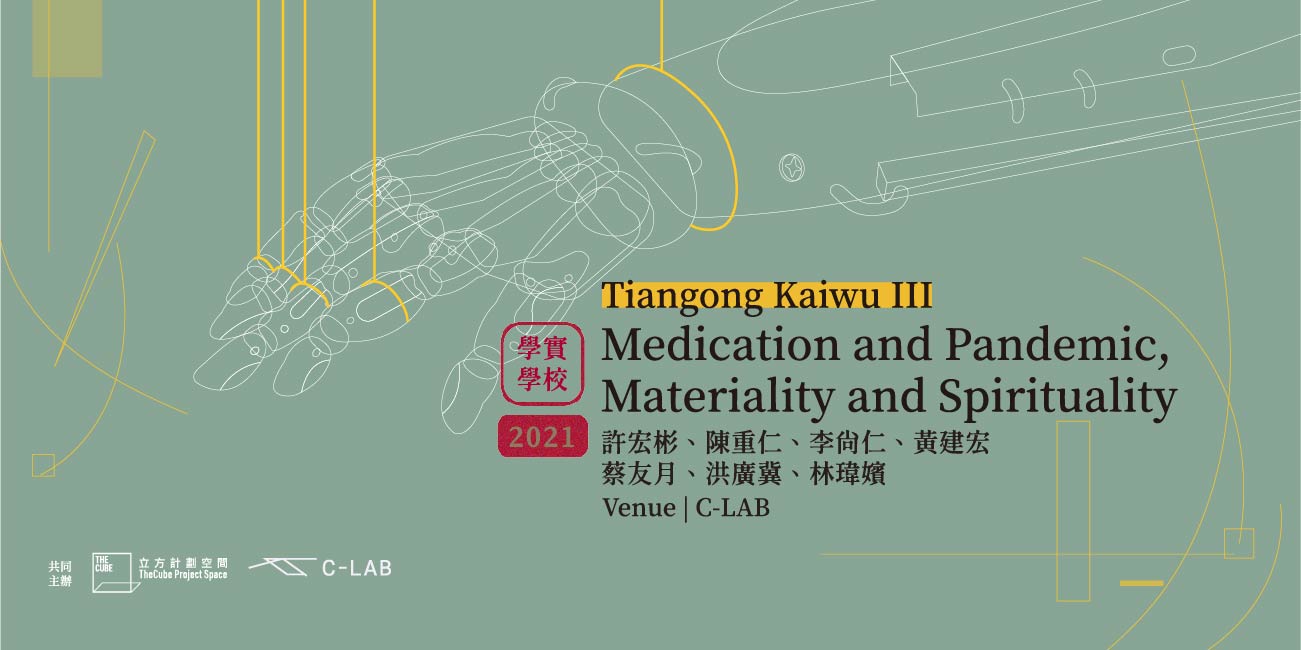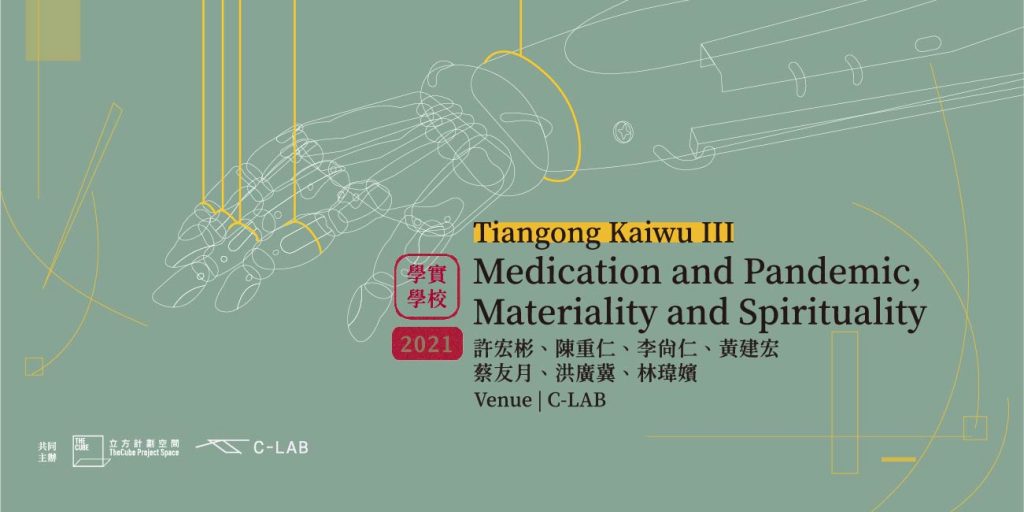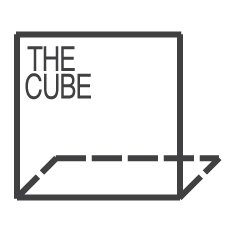
Tiangong Kaiwu III: Medication and Pandemic, Materiality and Spirituality

The Praxis School is an annual thematic lecture/workshop series by TheCube Project Space since 2016. Following the theme “Tiangong Kaiwu: Modern Life and the History of Technology” that ran through the events in the past two years, the “2021 Praxis School—Tiangong Kaiwu III: Medication and Pandemic, Materiality and Spirituality” seeks to explore the historical relations between humankind and objects as well as between life and technology. Throughout 2020, the world fell sharply under the catastrophic impact of the Covid-19 pandemic that caused dramatic changes in people’s individual and collective life. Therefore, the 2021 Praxis School will revisit the modern concepts of “medicine,” “illness” and “poison.” How do we (human beings) perceive and differentiate among them? What are the underlying spirit and belief? How do the political, economic and scientific systems in the contemporary society collectively forge the relationship between humanity and environment? The lecture series this year features a star-studded line-up of lecturers (incl. Hsu Hung-Bin, Chen Chung-Jen, Li Shang-Jen, Huang Chien-Hung, Tsai Yu-Yueh, Hung Kuang-Chi, and Lin Wei-Ping) from different disciplines (incl. cultural studies, history of literature, history of medicine, contemporary art, anthropology, history of science, and sociology). In addition to advancing the issues concerning pandemic, medicine and technology, these lecturers pay extra attention to the material improvement and spiritual construction in our quotidian existence; that is, they simultaneously reflect upon the past and envisage the future.
▍Schedule of the Lectures
2021/3/6 (Sat.) 2−4 pm Hsu Hung-Bin : The Taste of Opium
2021/4/10 (Sat.)2−4 pm Chen Chung-Jen :Technology of the Self and Politics of Fear in Narratives of Contagion
2021/7/3 (Sat.)2−4 pm Li Shang-Jen : Contagion and Foreign Bodies: Smallpox and Anti-Vaccination Movements in the Eighteenth and Nineteenth Centuries
2021/7/24 (Sat.)2−4 pm Hung Kuang-Chi:How Did “Ecology” Evolve into What It Is Today?
2021/8/7 (Sat.)2−4 pm Huang Chien-Hung : The Dream of Negentropy: Discrete Consciousness and Intelligence Revolution
2021/9/5 (Sat.)2−4 pm Tsai Yu-Yueh : How Genetic Technology is Rewriting Our Understanding of History :Ancestral Origin, Identity Politics and Scientific Debates
2021/9/25 (Sat.)2−4 pm Lin Wei-Ping:Atmospheric Taoism: Taiwan Contemporary “An Long Song Hu” Ritual in Transition
▍Outlines of Lectures
The Taste of Opium
Lecturer | Hsu Hung-Bin
Venue | C-Lab iCenter 2F
Date | 2021/3/6 (Sat.) 2−4 pm
Many people in Taiwan today do not know that the island was once home to a large number of opium smokers. People smoked opium in Taiwan from the early Chinese Qing Period (1683–1895) onward and the practice continued well into the Japanese colonial period (1895–1945), but memories of the practice quickly faded and it was seldom mentioned in post-war Taiwanese society. The social activities and smoking spaces of opium users remain unknown. Where did they smoke, and what did they do while smoking? Was it conducted indoor or outdoor? In private chamber or public space? Did smoker enjoy the pipe alone or with others? This talk will demonstrate that, as a popular social entertainment, convenient family medication and useful trade token, opium once played various key roles in the the development and colonization of the island dueing the late-nineteenth century. Under the colonial period, however, with the globalization, criminalization and medicalization of “opium problem,” opium-smoking gradually became an unpopular, inconvenient, and uncivilized social activities. By the end of the colonial rule, social spaces for opium-smoking was dramatically restricted by the authorities and the Taiwanese social elites, leaving smokers no place to go but hide in private chamber and enjoy his pipe by himself.
Technology of the Self and Politics of Fear in Narratives of Contagion
Lecturer | Chen Chung-Jen
Venue | C-Lab iCenter 2F
Date | 2021/4/10 (Sat.)2−4 pm
This lecture examines contemporary writings of contagions and their various manifestations as the unnamable thing itself in literature, popular culture and medical narratives, reinforcing the idea that the very essence of the contagion is not just their difference but more to do with the similarity with us. Narratives of outbreaks become the wholesale supplier in associating abnormality with idiosyncrasy, deviancy and unhealthiness, not just for disciplining mechanism but also for the technology of the self. I examine how management of global health and security exemplified in the writings of contagions. Traditional and contemporary outbreak narratives center on violent, infectious and usually corruptive individuals, commonly referring to the problematic category of the unknown, reveal a logic of exclusion and economy of fear in the production of cultural imagination of global bio-insecurity. This talk discusses how these cultural productions demonstrate and interrogate a totalizing politics of contagions that aim at assimilation and annihilation of the social others with the economy of fear.
Contagion and Foreign Bodies: Smallpox and Anti-Vaccination Movements in the Eighteenth and Nineteenth Centuries
Lecturer | Li Shang-Jen
Venue | Webex online
Date | 2021/7/3 (Sat.)2−4 pm
*In accordance with the latest anti-epidemic measures of the Taipei City Government, a Level 3 epidemic warning, the lectures of the 2021 Praxis School will remain canceled. For further information, please stay tuned to the official website and Facebook of TheCube Project Space.
Smallpox was one of the oldest infectious diseases of humankind, and throughout history, it had afflicted and killed a significant number of people. In Europe during the eighteenth century, for example, people who died of smallpox accounted for 10–15% of the total number of deaths, and during the Age of Discovery, Europeans spread the disease to America, causing a devastating epidemic among the indigenous peoples. Nevertheless, smallpox was the earliest disease to have had a developed vaccine, making it the first contagious disease eradicated by vaccination. English physician Edward Jenner (1749–1823) has generally been credited with creating the smallpox vaccine. Conducting experiments of using the cowpox virus to stimulate immunity against smallpox in 1796, Jenner reported the results and advocated cowpox inoculation in 1798. However, before his advocacy, cowpox inoculation had already been used as a folk remedy for smallpox, and variolization had been a long-standing practice to prevent smallpox in China and the Ottoman Empire. In another respect, anti-vaccination campaigns unfolded in some European countries as cowpox vaccination was widely promoted. The ostensible reason for the vaccine hesitancy was the fear of implanting alien matters from animals into the human body, but in reality, a combination of complex politico-cultural factors was invariably at play behind these campaigns. Drawing examples from smallpox, this lecture will introduce the history of vaccines as well as addressing the political mobilization and cultural imagination behind anti-vaccination campaigns.
How Did “Ecology” Evolve into What It Is Today?
Lecturer | Hung Kuang-Chi
Venue | Webex online
Date | 2021/7/24 (Sat.)2−4 pm
“Ecology” is undoubtedly one of the most crucial keywords in contemporary Taiwan. Its origin goes back to the term “Ökologie” coined by German biologist Ernst Haeckel in 1886, meaning “the study of dwelling” or the science of “home.” However, how did Ökologie evolve into ecology and then into what it is today? In the literal sense, Ökologie is markedly dissimilar from ecology. On top of that, when it comes to ecology, we tend to associate it with flora and fauna, whereas Ökologie is often deemed home-oriented. Therefore, it can be argued that the two terms represent the opposite ends of the spectrum. In this lecture, I will share my recent research findings about the environmental and ecological history of Taiwan. Specifically speaking, I will explain that the evolution from Ökologie to ecology not only concerned the experimental turn taken by occidental scholars in the mid-19th century, but also involved the Japanese intelligentsia’s attempt to be “detached from Asia and aligned with Europe” in the late 19th century as well as the sense of crisis that urged the Chinese to save their own country in the first-half of the 20th century. What makes the aforementioned process more intriguing was that, as the intelligentsia in Japan and China went out of their way to grasp the meanings of Ökologie and ecology, Taiwan became the Japanese Empire’s ecological laboratory on the one hand, and, after 1949, Chinese technocrats adopted ecology as the conceptual framework to reform the Taiwanese social system on the other. In sum, I will illustrate that the Taiwanese society has long been entangled with ecology. It is by no means a novel phenomenon arising after the lifting of martial law and the emergence of environmental movements. We, while being concerned about Taiwan’s environment, would fail to learn lessons from the environmental history of Taiwan, if we’re unwilling to confront and investigate such entanglements and instead arbitrarily outline an avaricious, predatory country so as to highlight the “novelty” of contemporary environmental and ecological conservation, and even examine the past from the present perceptive, imposing todays’ concept of conservation on historical actors.
The Dream of Negentropy: Discrete Consciousness and Intelligence Revolution
Lecturer | Huang Chien-Hung
Venue | Webex online
Date | 2021/8/7 (Sat.) 2−4 pm
What kind of world does the term “technological world” virtually imply? How does it relate to the society, world and globe that we generally understand via humanities? Does it still embrace the occidental concept of “epistemological break” and commodify “paradigm shift” over and over again?
Confronting key questions head-on, Bernard Stiegler’s groundbreaking studies on philosophy of technology and digital technology have induced a sea change in people’s thinking. His sudden demise is truly regrettable, yet the essential concepts he formulated, such as “pharmakon,” “organology,” “meta cinema” and “discrete image,” have been particularly inspiring, affording us sufficient ideological agency in response to the development of intelligence city and artificial intelligence. Centering on these key concepts, this lecture will discuss the possibilities of theoretical thoughts in the age of digital technology.
How Genetic Technology is Rewriting Our Understanding of History : Ancestral Identity Politics and Scientific Debates
Lecturer | Tsai Yu-Yueh
Venue | Webex online
Date | 2021/9/5 (Sat.)2−4 pm
STS Scholar Paul Brodwin (2005: 139) argued that “[t]racing one’s ancestry […] is no longer just a laboratory technique, but also a political act.” The advancement in genetic technology throughout the 1980s brought about new revolutions. In particular, since the “Human Genome Project” completed the draft human genome sequence, an increasing number of scientists around the globe have tried to rewrite history with genetic technology, and companies helping people trace their ancestry have mushroomed globally. The consequence has become apparent in the substantial influence on the politics of identity and difference. Following this academic trend, the scientific discourse on indigenous peoples’ genetic discourse aroused the discussion and controversy over the DNA sequence and origin of the Taiwanese, which not only exerted a profound effect on Taiwanese identity politics, but also ignited the scientific debates across the Taiwan Strait. Based on the sociology of scientific knowledge, this lecture will provide an introspective view of “reflexive biosociality.” The emergence of genetic research and discourse not only involves laboratory technology, but also has significant political implications. Avoiding the harmful effect of pseudoscience of racism is of great importance for our cogitation upon the role of sciences in ethnic or national identity.
Atmospheric Taoism: Taiwan Contemporary “An Long Song Hu” Ritual in Transition
Lecturer | Lin Wei-Ping
Venue | Webex Online
Date | 2021/9/25 (Sat.)
The rice dragon was originally a feature in the “An Long Xie Tu” religious ceremony of the Zhengyi Taoism in northern Taiwan. However, in the past twenty years, there have been significant changes in the scale, timing and frequency of the ceremony. In recent years, the production of the rice dragon has not only grown from the size of a simple straw mat to a larger one, but has also moved on to become more artistic and a medium for creating atmosphere. This presentation explored the meanings of contemporary ritual changes in “An Long” through the example of two famous An-Long Taoist priests – You-Kun Li from Taipei-Fu Chenghuang Temple and Chun-Nan Yeh from Hsinchu Tai-Chu-Xuan-Qing Temple.
▍About the Lecturers
Hung Bin Hsu
I am an associate professor in History Department of National Cheng Kung University. My main interest is exploring the interweaving and co-constructing relationship between modern science, technology, medicine and Taiwanese society (STS or STM). I currently working on two projects. First, the history of opium, with special reference to colonial technoscientfic and medical practices that modernized opium and its users. Second, the history of daily practice of Taiwanese physicians, like home visit, and its relationship with state, market, profession, communities and patients.
Chen Chung-Jen
Chen Chung-Jen is a professor in the Department of Foreign Languages and Literatures at National Taiwan University, Taiwan. His research interests include nineteenth-century British novels, contemporary British fiction, and interdisciplinary studies in medicine and literature. His Empire, Medicine and 19th-Century English Literature (Bookman, 2013) examines the interrelations between medical advancement, literary imagination and imperial expansion. His latest publication, Victorian Contagion: Risk and Social Control in the Victorian Literary Imagination (Routledge, 2019) investigates Victorian medical discourse around cleanliness and contagion, including all its treatments and preventions, developed into a culture of medicalization, a perception of surveillance, a politics of health, an economy of morality, and a way of thinking. This book is an attempt to understands the literary and cultural elements which contributed to fear and anticipation of contagion, and to explain why and how these elements still matter to us today.
Li Shang-Jen
Li Shang-Jen received his Ph.D. from the Centre for the History of Science, Technology and Medicine, Imperial College, University of London, and worked as a postdoctoral fellow at the Wellcome Institute for the History of Medicine. He is now a research fellow at the Institute of History and Philology, Academia Sinica. Li works on the history of Western medicine in nineteenth-century China and the history of tropical medicine. He has published a book entitled A Physician to the Empire: Patrick Manson and the Founding of British Tropical Medicine (2012) and numerous articles.
Huang Chien-Hung
Born in Kaohsiung City, Taiwan, Based in Taipei, Taiwan.
Associate Professor of Graduate School of Interdisciplinary Arts National Taipei University of Arts, Institute of Trans-disciplinary Arts. He has published numerous books, including Trans-fiction: Investigation project of Asia (2017), Discordant Harmony (2016), Smile of Montage (2013) , Trans-Plex Agenda (2011), An Independent Discourse (2010). Huang has curated shows such as Trans-Justice, in Taipei MoCA (2018), Discordant Harmony in Kuandu Museum, Trans-Archiving in PhotoAura Space (2016), Discordant Harmony in Artsonje Center, in Seoul; Exhibition Histories in Asia, in ACC of Gwangju; Discordant Harmony in Hiroshima MoCA (2015), POST-movements: Nights of Café Muller in Kuandu Museum (2014), Romance of NG in Tina-Ken Gallery, Schizophrenia Taiwan 2.0 in Linz (2013).
Hung Kuang-Chi
Hung Kuang-Chi earned his Ph.D. from the Department of the History of Science, Harvard University, with specialization in environmental history, biogeography, and evolutionary biology. He carried on his postdoctoral research at the Arnold Arboretum, the Smithsonian Institution, and the Needham Research Institute. Currently he teaches as an assistant professor in the Department of Geography, National Taiwan University.
Tsai Yu-Yueh
Yu-Yueh Tsai is an associate researcher in the Institute of Sociology, Academia Sinica. Her recent research interests focus on Taiwan Biobank, Taiwanese indigenous peoples’ genes and identity politics, as well as the participants in Taiwanese ancestry genetic testing. Her articles can be seen in scholarly journals such as Taiwanese Sociology, Taiwanese Journal of Sociology, BioSocieties, East Asian Science, and Technology and Society: An International Journal. She is the author of TMental Disorder of the Tao Aboriginal Minority in Taiwan : Modernity, Social Change, and the Origin of Social Suffering. In collaboration with other scholars, Tsai edited several books such as Abnormal People?: Psychiatry and the Governance of Modernity in Taiwan, and Post-Genomic Taiwan: Shifting Paradigms and Challenges. She also directed the documentaries Word 85033 and Commitment! Dr. Mark C. Thelin and Taiwanese Sociology, 1955~1999.
Lin Wei-Ping
Lin Wei-Ping received her Ph.D. in Anthropology from Cambridge University. She is a Professor at National Taiwan University. She was affiliated with the Harvard-Yenching Institute in 2005-6 and 2017-8, and with the Fairbank Center for Chinese Studies at Harvard University in 2012-3. Her interests include Chinese religion (including topics related to material culture, spirit mediums, and urban religious transformation), kinship, and digital technologies. She is the author of Materializing Magic Power: Chinese Popular Religion in Villages and Cities (Harvard University Asia Center, 2015), and the editor of Mediating Religion: Music, Image, Object and New Media (Taiwan University Press, 2018; in Chinese).
Organizer | TheCube Project Space
Co-organizer | Taiwan Contemporary Culture Lab
* TheCube Project Space is sponsored by National Culture and Arts Foundation, Department of Culture Affairs, Taipei City Government, RC Culture and Arts Foundation, Winsing Arts Foundation and Dr. Chen Po-Wen.


